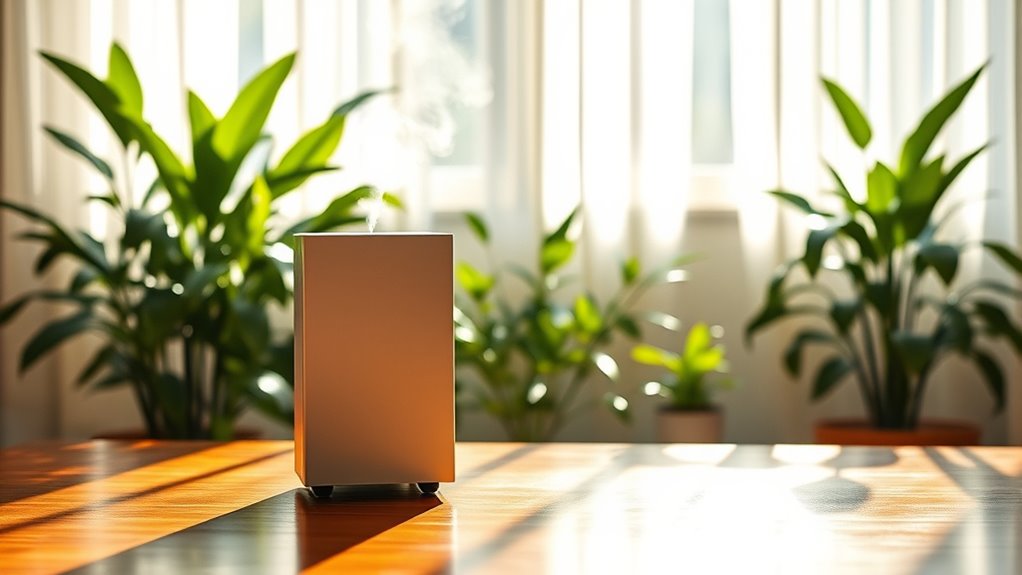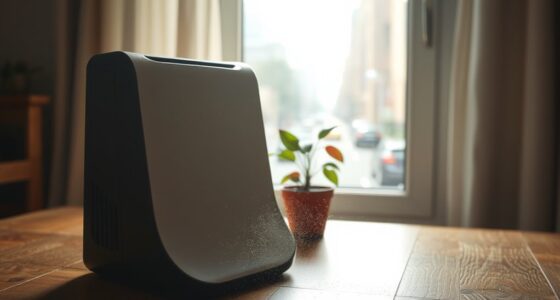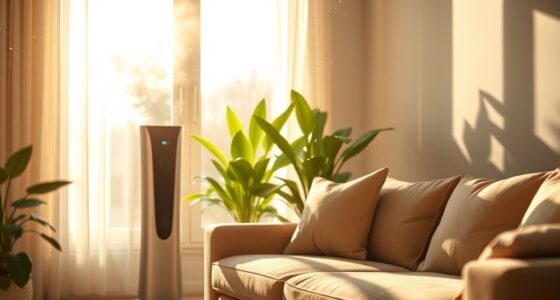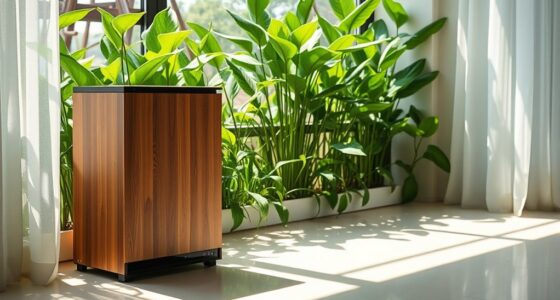Air purifiers can be safe and effective for improving your indoor air quality, but you need to know the potential risks. Some models, especially ozone generators, may harm your lungs. Choosing units with HEPA filters is essential for allergen removal, and keeping an eye on maintenance guarantees peak performance. Additionally, you can explore other effective methods to enhance your air quality. Keep going to uncover more about how to choose the right purifier for your needs!
Key Takeaways
- Many air purifiers with HEPA filters are safe and effectively improve air quality by trapping harmful particles.
- Ozone generators and ionizing purifiers pose health risks, potentially causing respiratory issues and increasing harmful air pollutants.
- Regular maintenance and filter replacement are crucial to ensure air purifiers function safely and efficiently.
- Smart technology in modern air purifiers allows for safe, controlled use within your home environment.
- Alternative methods like ventilation and cleaning can complement air purifiers for safer indoor air quality.
What Are Air Purifiers?
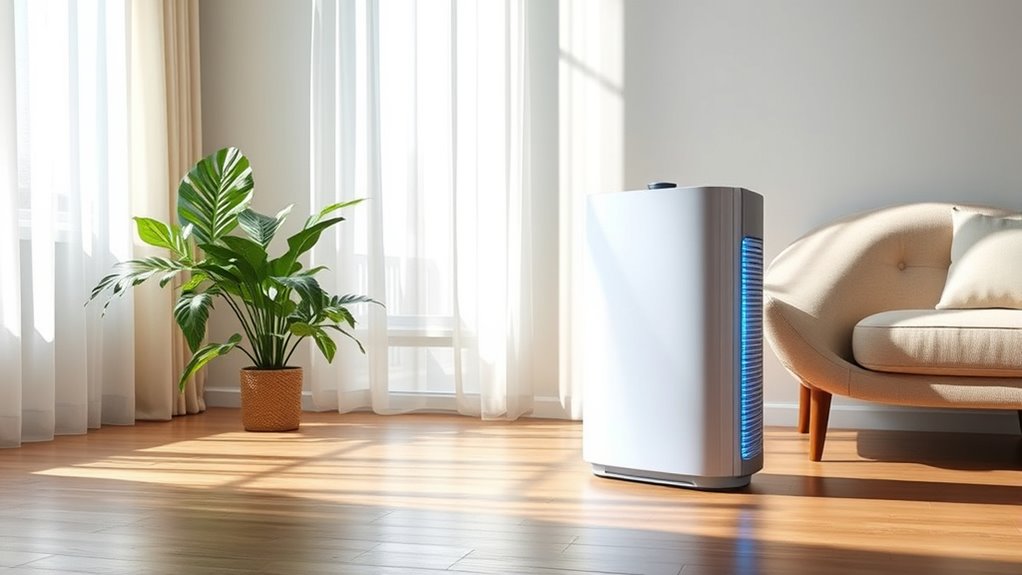
Air purifiers are vital devices that help you breathe easier by filtering and cleaning the air in your home. They’re designed to trap airborne pollutants like dust, pollen, mold spores, and bacteria, greatly improving your indoor air quality. Many air purifiers utilize HEPA filters, which capture 99.97% of particles down to 0.3 microns, making them incredibly effective for reducing allergens. You’ll also find models with carbon filters for odors and gases, though ozone generators are often deemed unsafe. Additionally, many units offer auto functionality that adjusts operations based on air quality detection. The Clean Air Delivery Rate (CADR) measures an air purifier’s effectiveness, and it’s important to choose a unit with a CADR that matches at least two-thirds of your room size. Indoor air quality can be up to 5 times worse than outdoor air, making air purifiers essential for healthier living. Regular maintenance, like changing HEPA filters and cleaning the unit, keeps it running efficiently. Incorporating hybrid/combination units can provide enhanced filtration methods for improved air quality. Some advanced models utilize True HEPA filters that are particularly effective in capturing a wide range of airborne pollutants. Consistent maintenance practices ensure that air purifiers operate at peak efficiency over time.
Do Air Purifiers Have Health Risks?
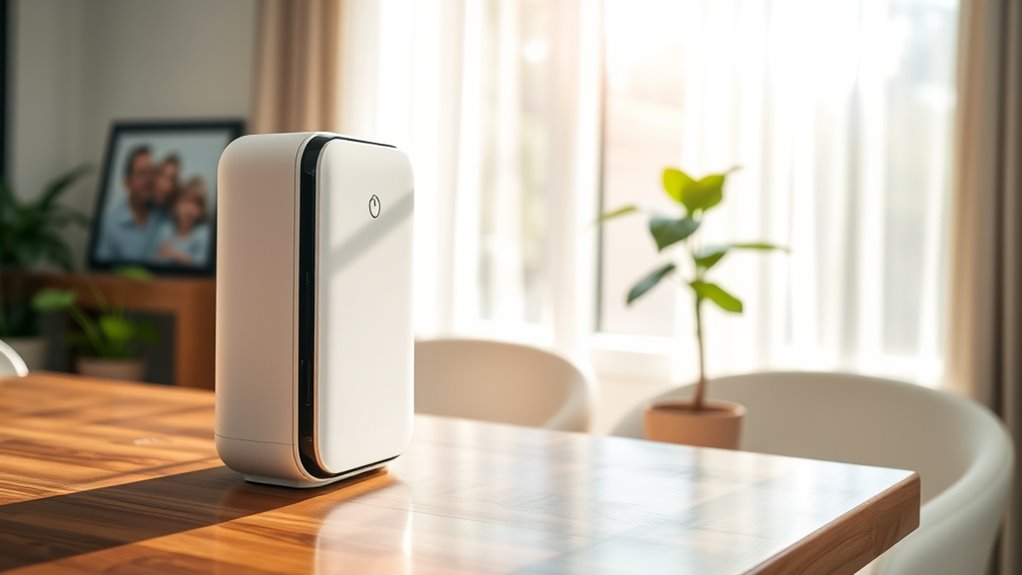
While many people rely on air purifiers to enhance their indoor air quality, it’s important to recognize that some models can pose health risks. Ozone generators, for example, emit ozone, which can worsen respiratory conditions. Ionizing air purifiers might reduce certain VOCs but can increase other harmful ones, leading to irritation and headaches. Additionally, while some air purifiers target particulate matter, they may inadvertently create new pollutants. It’s vital to choose HEPA-certified models to avoid recirculating smaller particles, as non-HEPA devices can diminish their intended benefits. Using essential oils for safe practices can also help support a healthier indoor environment. Furthermore, the importance of AI security in monitoring indoor air quality ensures that air purifiers function safely and effectively. Regular maintenance of air purifiers is crucial to ensure optimal performance and prevent common issues that may arise from neglect. Following manufacturer guidelines for maintenance can help ensure that air purifiers operate efficiently and safely.
| Health Risk | Source | Potential Effect |
|---|---|---|
| Ozone Emission | Ozone Generators | Lung Damage |
| Increased VOCs | Ionizing Purifiers | Irritation & Headaches |
| Non-HEPA Particles | Non-HEPA Models | Respiratory Issues |
Benefits of Using Air Purifiers
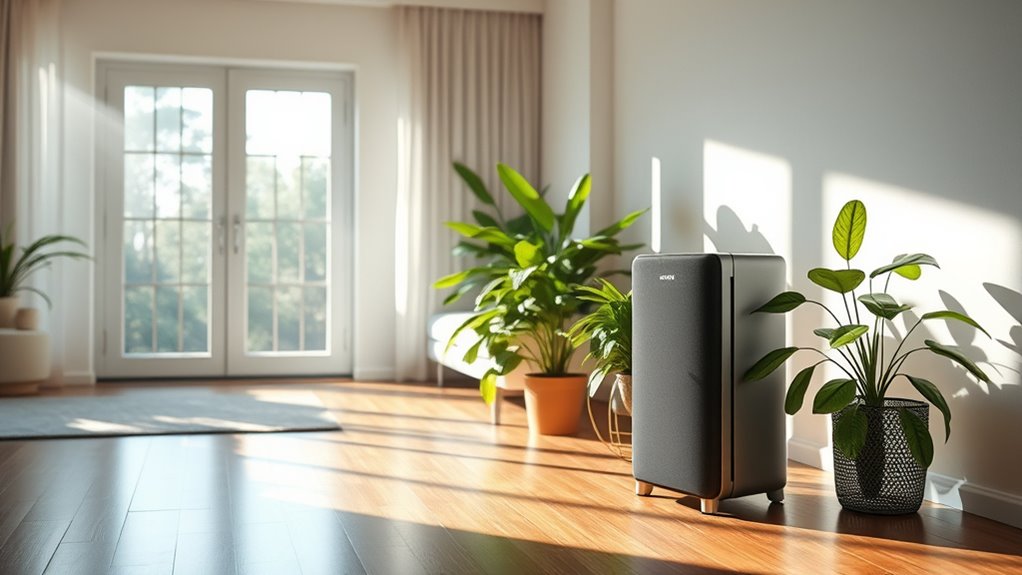
Using air purifiers can greatly improve your indoor environment, especially if you suffer from allergies or respiratory issues.
These devices effectively remove airborne particles, including dust, pollen, and mold spores, helping to enhance your air quality. By utilizing air purifiers with HEPA filters, you can expect significant relief from asthma and allergy triggers, as they continuously filter harmful pollutants. Additionally, integrating smart home devices can enhance the functionality of air purifiers, allowing for remote monitoring and control. Regular maintenance and filter replacement are essential for optimal performance and longevity. Seasonal maintenance checks can also improve efficiency significantly. Furthermore, antioxidants present in some air purifiers can help reduce inflammation, which is beneficial for respiratory health.
Many high-performance models also target volatile organic compounds (VOCs), further improving air. Plus, portable air purifiers offer flexibility, allowing you to customize air cleaning solutions for different spaces like bedrooms or offices. Additionally, air purifiers equipped with HEPA filtration are essential for capturing small particles effectively, ensuring better air quality in your home.
Regular use can lead to a noticeable decrease in indoor air pollutants, promoting better health effects and creating a healthier living environment.
Factors to Consider Before Buying
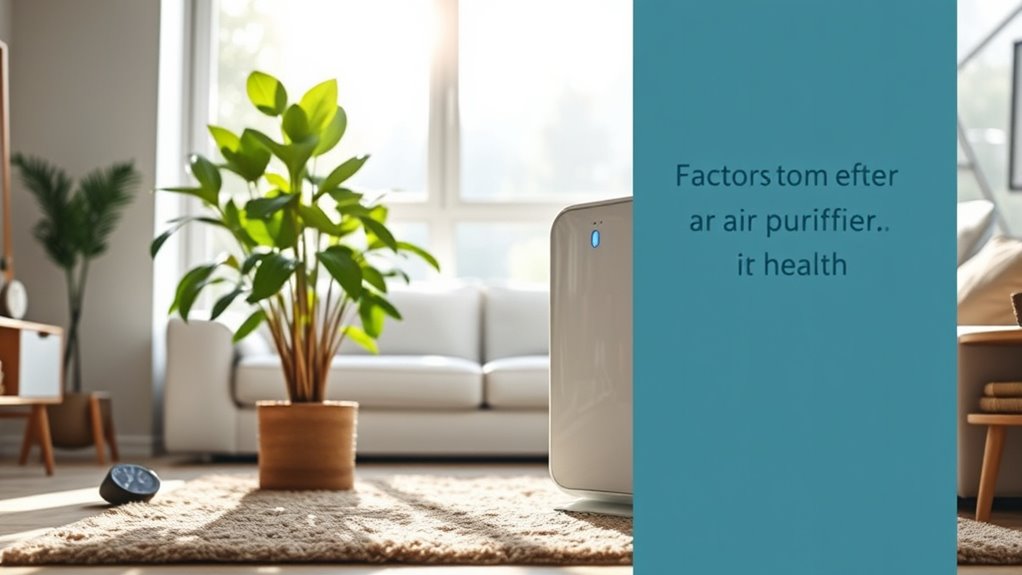
When choosing an air purifier, it’s vital to take into account several key factors to guarantee you get the best fit for your needs.
First, prioritize models with HEPA filters, which effectively capture 99.97% of particles in the air down to 0.3 microns, ensuring allergen removal. Additionally, some heat pumps designed for improved air quality can also help reduce indoor pollutants by utilizing energy-efficient systems that enhance air circulation. Air quality is a major consideration for families, particularly those with young children or infants. A smooth finish in air quality can be achieved with effective purification, reducing the presence of harmful particles.
Next, check the Clean Air Delivery Rate (CADR); it should match at least two-thirds of your room size for ideal air cleaning.
Don’t overlook noise output either—aim for purifiers with levels between 24 to 36 dB to minimize disturbance.
Finally, consider the specific pollutants you want to target, as some purifiers also remove gases and volatile organic compounds (VOCs), which can greatly impact health. Regular maintenance is essential to keep your purifier functioning effectively, much like the maintenance needs of a heat pump to ensure optimal performance. Additionally, ensure you monitor air quality indicators regularly to assess the purifier’s performance and address any maintenance needs promptly.
Alternative Ways to Improve Air Quality

To enhance your indoor air quality, consider implementing a few simple practices that can make a significant difference.
Start by increasing ventilation; open windows and doors to allow fresh air in and dilute harmful air pollution. Use fans or air conditioning systems to enhance air exchange rates, reducing trapped pollutants.
Regular cleaning methods, like dusting and vacuuming, remove airborne allergens and maintain a clean space. Additionally, keep indoor humidity between 40%-60% to curb mold and dust mites, common indoor allergens. Incorporating biodiversity practices such as introducing houseplants can also help purify the air by absorbing toxins and releasing oxygen.
Finally, remove pollution sources such as tobacco smoke and strong cleaning chemicals. These steps collectively promote effective air purification and create a healthier living environment without relying solely on air cleaners. Furthermore, incorporating organic gardening practices can improve air quality by increasing oxygen levels and reducing indoor pollutants.
Frequently Asked Questions
Are There Any Dangers With Air Purifiers?
Yes, there are dangers with air purifiers. Some, like ozone generators, can produce ozone that worsens respiratory issues and damages lung tissue.
Even ionizing purifiers might increase harmful VOCs, causing irritation or nausea. Not all purifiers are HEPA-certified, which means they may recirculate harmful particles instead of filtering them out.
To keep your air clean and safe, make sure to maintain your unit regularly by changing filters and cleaning it as needed.
How Do I Know if My Air Purifier Is Ozone Free?
Imagine traversing a forest, seeking clean air.
To guarantee your air purifier is ozone-free, look for a badge of honor—an official certification showing it meets U.S. EPA standards for ozone emissions, below 0.05 ppm.
Avoid ozone generators and ionizers, as they can turn your haven into a health hazard.
Instead, seek purifiers boasting HEPA filters, capturing 99.97% of harmful particles without producing ozone.
Research reviews and opt for models certified by trusted organizations for peace of mind.
What Do Doctors Say About Air Purifiers?
Doctors generally support using air purifiers, especially those with HEPA filters, as they effectively capture harmful airborne particles like allergens and dust.
You’ll find that many healthcare professionals advise against ozone-generating purifiers due to potential respiratory risks.
They stress the importance of regular maintenance and filter changes to keep your purifier working properly.
What Are the Side Effects of the Ionizer on Air Purifiers?
When using an ionizing air purifier, you might experience some side effects.
These devices can increase harmful volatile organic compounds (VOCs) like acetone and toluene, which may lead to irritation and nausea.
Additionally, prolonged exposure could potentially harm your liver, kidneys, and nervous system.
While they may reduce particulate matter, recent studies suggest they could negatively impact cardiovascular health.
It’s essential to weigh these risks against any benefits before deciding to use one.
Conclusion
To sum up, air purifiers can be a great addition to your home, especially since studies show that indoor air can be up to five times more polluted than outdoor air. While there are some potential health risks, the benefits often outweigh them, especially for those with allergies or respiratory issues. By choosing the right purifier and considering your specific needs, you can greatly improve your air quality and create a healthier living environment for yourself and your family.
